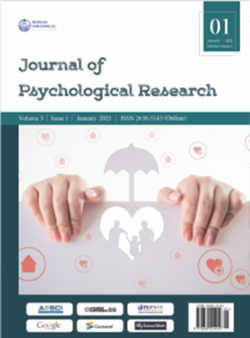-
697
-
588
-
403
-
318
-
299
The Effect of WeChat Usage on Upward Social Comparison in Undergraduates
DOI:
https://doi.org/10.30564/jpr.v3i1.2804Abstract
To explore the status of undergraduates’ WeChat usage and upward social comparison, and analyze the relationship between the above two variables. Totally 754 WeChat undergraduates were selected through poster recruitment from 5 colleges in Guangdong Province. They were investigated with Access Frequency to Social Networking Site Scale (AFSNSS), Upward Social Comparison Subscale of Iowa-Nwtherlands Comparison Orientation Measure (INCOM-USCS). The score of overall emotional engagement(OEE) of AFSNSS and the total standard score of INCOM– USCS (TSSI-U) were (22.41±4.70) and (0±4.5), respectively. The correlation between WeChat frequency and TSSI-U was not significant. TSSI-U was significantly positively correlated with the score of OEE and other items of AFSNSS (r=0.161~0.413, P <0.01). Multiple linear regression analysis showed that The scores of item 1,7and 8 of AFSNSS, as well as family economic status, grade ranking of academic performance (GRAP) and the purpose of WeChat use were postively correlated with TSSI-U (β=.104~.234, P<.05). Class cadre or not and origin were negatively correlated with TSSI-U (β=-.089, -.130, P<.05). Conclusion: It suggests that WeChat usage may be a related factor for undergraduates’ upward social comparison.
Keywords:
Undergraduates; WeChat Use; Upward Social Comparison; Related FactorReferences
[1] Klein, w.m. Objective standards are not enough: Affective, self-evaluative, and behavioral responses to Social comparison information[J]. Journal of Personality and Social Psychology, 1997, 72(4): 763-774.
[2] Chuang Zhang. The Effects of Upward Social Comparison on Workplace Envy: Moderate of Gender Identification and Self-Esteem [J]. American Journal of Industrial and Business Management, 2020, 10(3): 531-534.
[3] V. Paz, E. Nicolaisen-Sobesky, E. Collado, et al. Effect of self-esteem on social interactions during the Ultimatum Game[J]. Psychiatry Research, 2017, 252: 235-248..
[4] Wei Wang, Mingzhu Wang, Qian Hu, et al. Upward social comparison on mobile social media and depression: The mediating role of envy and the moderating role of marital quality [J]. Journal of Affective Disorders, 2020, 270: 143-149.
[5] Cyberspace Administration of China. The 45th China Statistical Report on Internet Development [R]. http://www.cac.gov.cn/2020-04/27/c_1589535470378587.htm.
[6] Yueli Zheng, Xiujuan Yang, Ran Zhou, et al. Upward social comparison and state anxiety as mediators between passive social network site usage and online compulsive buying among women [J]. Addictive Behaviors, 2020, 111:36-47.
[7] Hu Yuting, Liu Qingqi .Passive social network site use and adolescent materialism: Upward social comparison as a mediator [J]. Social Behavior & Personality: an international journal, 2020, 48(1): 1-8.
[8] Liu Pei, He Jinglun, Li Aimei . Upward social comparison on social network sites and impulse buying: A moderated mediation model of negative affect and rumination [J]. Computers in Human Behavior, 2019, 96: 133-140.
[9] So-Ra Jeong ,Hyun Myoung Ho. The mediating effect of upward social comparison moderated by control flexibility on the relationship between scial ntwork srvice use intensity and depression: Focused on instagram [J]. The Korean Journal of Health Psychology, 2017, 22(4): 1035 - 1053.
[10] Liu Qingqi, Zhou Zongkui, Yang Xiujuan, et al. Upward social comparison on social network sites and depressive symptoms: A moderated mediation model of self-esteem and optimism [J]. Personality and Individual Differences, 2017,113: 223-228.
[11] H. S. Yang, J. H. Kim, & M. H. Se. Does Facebook Make Us Happy? : Examining the relationship among college students’ facebook use, upward social comparison and life satisfaction [J]. Korean Journal of Journalism & Communication Studies, 2014, 58(6): 215-244.
[12] Sang, Y.L. How do people compare themselces with others on social network sites? The case of facebook [J]. Computes in Human Behavior, 2014, 32: 253-360.
[13] Cohen J. Statistical power analysis [J] . Curr Direct Psychol Sci, 1992, 1(3): 98-101.
[14] ZHANG Houcan, XU Jianping. Modern psychology and education statistics [M]. Beijing: Beijing Normal University Publishing Group, 2012.
[15] ELLISON N.B. Social network sites: Definition, history, and scholarship [J]. Journal of Computer-Mediated Communication, 2007, 13(1): 210-230.
[16] NIU Gengfeng, BAO Na, ZHOU Zongkui, et al. The impact of self-presentation in online social network sites on life satisfaction: The effect of positive affect and social support [J]. Psychological Development and Education, 2015, 31(5): 563-570.
[17] Gibbons F, Bunnk B. Individual difference in social comparison: Development of the scale of social comparison orientation [J]. Journal of Personality and Social Psychology, 1999, 76(1): 129-142.
[18] Bai Xuejun, Liu Xu, Liu Zhijun. The mediating effects of social comparison on the relationship between achievement goal and academic self-efficacy: Evidence from the junior high school students [J]. Journal of Psychological Science, 2013, 36(6): 1413-1420
[19] Wang Xiaotian. The college students’ self-presentation and intensityof social network sites [D]. Guangzhou University. 2013, 05.
[20] Yang Ying. Relationship between WeChat use intensity and life satisfaction of undergraduates: Aserial mediating role model [D]. Shandong Normal University. 2018, 06.
[21] Fang Nan. Self-presentation in the differential model of association: Analysis on the motivation of college students’ sharing behavior in WeChat friend circle [J]. Journal of Chongqing University of Posts and Telecommunications (Social Science Edition), 2020, 32(5): 92-100.
[22] Wang Mingxia. The crime of internet fraud and its prevention and control countermeasures [J]. Legal System and Society, 2016, (3): 221-222.
[23] ZHANG Guiping, LI Tai, LIU Yue. Study on the influencing mechanism of upward social comparison on social inhibitory behavior [J]. Heilongjiang Researches on Higher Education, 2017, (10): 131-135.
[24] Jiawei,Geng, H.J.Cai, Lei Wang, et al. Comparison of self-assertiveness demands and Maslow’s hierarchy of needs [J]. Management Science and Research, 2014, 3(2): 59-62.
[25] XUE Ying, ZHENG Jingyi, LIU Yuting, et al.Effects of social networking sites use intensity and social comparison on jealousy [J]. Value Engineering, 2020, (2): 227-230.
[26] Liang Lei, Luo Quanzhi. Investigation and studys on the popularity of different types of WeChat public numbers among Nanjing university students [J]. Jiangsu Science & Technology Information, 2020, (8):72-76.
Downloads
How to Cite
Issue
Article Type
License
Copyright © 2021 Yongmei HOU, Xiaoying YI

This is an open access article under the Creative Commons Attribution-NonCommercial 4.0 International (CC BY-NC 4.0) License.




 Yongmei Hou
Yongmei Hou





